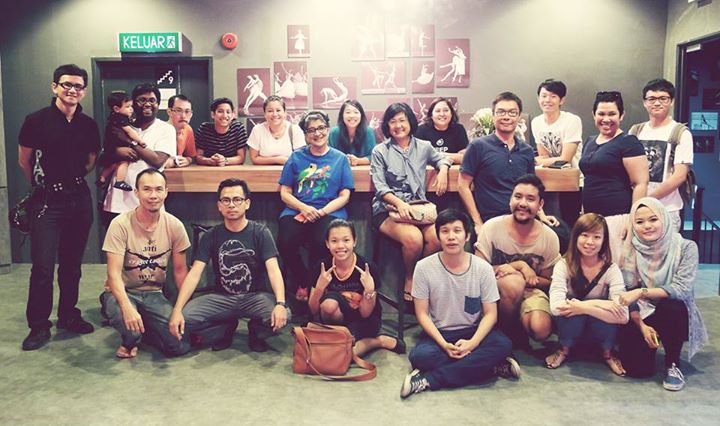Motivations to Join Five Arts Centre
Mark once said that history, connection to the context of art, and connections between artists were important for him, and that was his motivation to join Five Arts Centre. He also said that he sees the Centre as the representation of the desirable future of Malaysia and the practice of how to connect people from diverse backgrounds. I felt that in today's conversation again and was convinced that the idea hasn't changed.
Mark: You are right.
Higuchi: I haven't heard about June's motivation to join the Centre. Can you talk about it?
June: It was my personal interest. I have always been interested in performing arts. I specialized in science, so I have a desire to understand the systems or frameworks of things. I thought art was an intangible system, and was curious about it. At that time, one of the founders of the collective, Marion D'Cruz had been my teacher in school and when I told her I was interested, she immediately hired me as an assistant to a stage manager.
In the show that I was involved in for the first time, called "Family", the audience would walk around in an abandoned building. There wasn't a stage, and it was impossible to manage, which fired up my curiosity from the beginning. It was in 1998.
By the way, I was recruited by Marion at a sushi restaurant called Sushi King. Isn't it a perfect story for an interview by The Japan Foundation? (laughs)
Friction Coming from Experience and View on Art - Understanding through Dialogue and Succession of Knowledge
Higuchi: Mark and June joined the collective some twenty years after the establishment, and young people who don't know about the atmosphere around the establishment have joined too. Has there been friction coming from generation gaps or difference in experience like you had in the house carrying project? Or can it be said to be educational care by the elders for artists and managers of the next generation?
June: I think that it is more about friction between individuals rather than generations. There are 14 people, each with an opinionated dominating personality: it's inevitable that these egos confront at some point. Many of the members are teachers, so they are fluent speakers. There are often confrontations between "those who have words" and "those who don't." In my case, I was from the outside of the field from the beginning, so it was difficult to have a smooth conversation, probably because I didn't share the language and the way I viewed art was external to them. In that sense I think the differences and confrontations are personal, but probably Mark thinks differently.
Mark: I think there has been a healthy and productive tension between generations. That is perhaps because I tend to see things from a historical point of view. Many of the key members of Five Arts are women who were in the student movement in the 1970s, and probably the first generation as female university graduates – people such as Marion D'Cruz, Janet Pillai, Anne James, Ivy Josiah. They saw performing arts from a more nationalist position. This was the current in the 1970s and the environment in which they were educated, a hope and belief in the nation building project. That means they belong to the generation that worked on, for example, the reinterpretation of local traditions in contemporary languages.
This generation has become educators and invented methodologies, systems or philosophies. I realized when I myself became a teacher that knowledge and information are not only contextual but also political. I suppose that has already been tacitly understood in their generation.
They are very influential, building training systems for performing arts at Malaysian universities, and their experience must have been very exciting. In other words, they have also become authoritative.
In Five Arts Centre I think to have dialogues with their generation is to engage with very useful friction. I think we share the awareness that knowledge should be handed down with humor, even if that looks silly sometimes.
Higuchi: Younger people should join Five Arts Centre in the future. Your generation will be the leader of the Centre. What kind of attitude do you think you will take?
June: I think it's not really about generations. I'm older than Mark, but joined Five Arts Centre after him. Rather than ages and generations, I think we will consider what the collective needs when involving new people.
Mark: June's initial work with Five Arts was in stage management, and she was paid for her work. But as soon as she became a collective member, she wasn't paid anymore as Five Arts members used to get paid last – we paid other collaborators first. So we often joke that the stupidest decision one can make is to become a member of Five Arts Centre (laughs).







